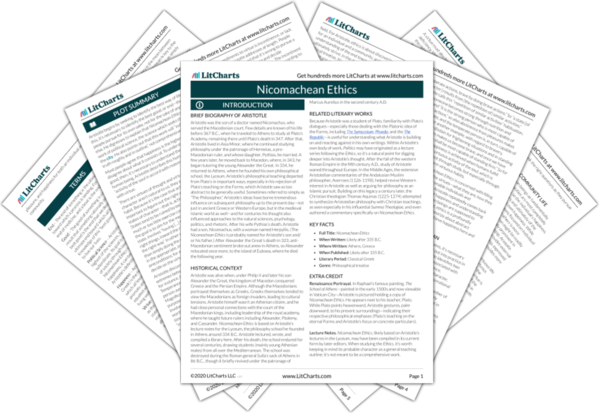Mean Quotes in Nicomachean Ethics
First, then, we should observe that these sorts of states naturally tend to be ruined by excess and deficiency […] The same is true, then, of temperance, bravery, and the other virtues. For if, for instance, someone avoids and is afraid of everything, standing firm against nothing, he becomes cowardly; if he is afraid of nothing at all and goes to face everything, he becomes rash. Similarly, if he gratifies himself with every pleasure and abstains from none, he becomes intemperate; if he avoids them all, as boors do, he becomes some sort of insensible person. Temperance and bravery, then, are ruined by excess and deficiency, but preserved by the mean.

Unlock explanations and citation info for this and every other Nicomachean Ethics quote.
Plus so much more...
Get LitCharts A+That is why it is also hard work to be excellent. For in each case it is hard work to find the intermediate; for instance, not everyone, but only one who knows, finds the midpoint in a circle. So also getting angry, or giving and spending money, is easy and everyone can do it; but doing it to the right person, in the right amount, at the right time, for the right end, and in the right way is no longer easy, nor can everyone do it. Hence doing these things well is rare, praiseworthy, and fine.
Mildness is the mean concerned with anger. [...] The person who is angry at the right things and toward the right people, and also in the right way, at the right time, and for the right length of time, is praised. This, then, will be the mild person, if mildness is praised. For [if mildness is something to be praised,] being a mild person means being undisturbed, not led by feeling, but irritated wherever reason prescribes, and for the length of time it prescribes. And he seems to err more in the direction of deficiency, since the mild person is ready to pardon, not eager to exact a penalty.












